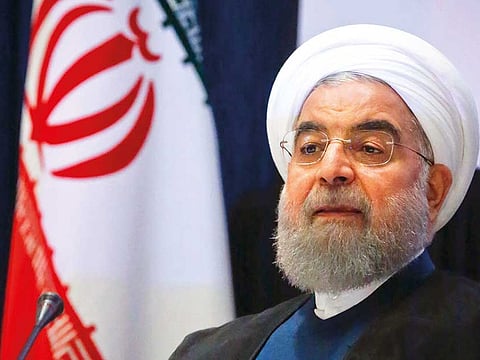US policy on Iran is confusing and risky
The Trump administration’s ideal scenario is for Iran to implode from within under the weight of heavy economic sanctions

It wasn’t so long ago that former US president Barack Obama was actively courting Iran’s ayatollahs with personal messages marking the Iranian New Year and a promise of normalised US-Iranian relations. Obama was seemingly oblivious to Tehran’s regional aggression as well as its ballistic missile programme when he patiently crafted a nuclear deal with the aid of the UN Security Council’s five permanent members plus Germany that was designed to enrich Iran and return it to the international fold.
Obama was misguided. He succeeded in alienating not only Israel but also Saudi Arabia and its Gulf allies. President Donald Trump rightly termed the deal ‘horrible’ and ‘one-sided’. But at least Obama’s pro-Iran policy was consistent.
America’s friends and foes knew with certainty where they stood whereas Trump’s threatening rhetoric against the Islamic republic followed-up by an offer to meet with the regime’s leaders without preconditions was bizarre, just as off-the-wall as his warning to launch ‘fire and fury’ on North Korea one minute and the next heaping praise on its leader. Kim Jong-un went from being dubbed “a madman” and “a murderer” to a “very honourable” individual in a matter of weeks.
That confusing strategy has been hailed as paying off in the case of North Korea although the US is still awaiting tangible evidence that Pyongyang is working towards denuclearisation of the Korean peninsula. Even so the threat of imminent war has abated for now. Both sides are still talking.
However, a similar format is unlikely to bring Iran’s Revolutionary Guard and religious establishment to heel partly due to domestic concerns but mostly because in Iranian eyes Trump’s unilateral withdrawal from the nuclear deal has marked him as someone who cannot be trusted.
The unorthodox US president’s capitalised tweet was almost the same as that sent to Kim Jong-un — “Never, ever threaten the United States again or you will suffer consequences the likes of which few throughout history have ever suffered before”. The first time such language was used it had real impact. Now it begins to sound like a bluff.
Furthermore, Trump’s hawkish anti-Iranian team is sending out messages at odds with the president’s. For instance, Trump said any meeting would be without preconditions, yet the secretary of state has listed 12 specific conditions.
As things stand, Trump’s offer to discuss a new deal has been rejected by the supreme leader Ali Khamenei, the Iranian president Hassan Rouhani and by the commander of Iran’s elite Quds Force Qasem Sulaimani who has labelled Trump’s threats “cabaret-style rhetoric”. “We are near you, where you can’t even imagine,” he said. “We are ready. We are the man of this arena”.
US sanctions are due to be reinstated against Iran today with more to come later in the year. Iran has warned that if its export of oil is impeded, it will retaliate by blocking the Straits of Hormuz through which 20 per cent of the planet’s oil supply traverses. As if to prove a point Iran is currently carrying out naval exercises in the area involving up to 100 vessels.
Amid an escalating war of words we have yet to see which side will blink first. The danger is that neither will for fear of appearing weak when the clouds of war will loom large. “Mr Trump, don’t play with the lion’s tail,” said Iran’s supposedly moderate President Rouhani last month, adding, “War with Iran is the mother of all wars”.
The inner workings of the American president’s mind are fluid and largely undecipherable but it is likely that he isn’t seeking an all-out confrontation that would send oil prices through the roof. Besides the toll on human lives, global markets would be destabilised and Europe could be faced with new waves of asylum-seeking refugees. Tourism and investment throughout the region would come to a virtual halt.
The Trump administration’s ideal scenario is for Iran to implode from within under the weight of heavy economic sanctions. Certainly there is widespread discontent within the country. Anti-government protests have erupted in all major cities which have been ruthlessly quelled.
Investment has dried up. The currency has lost 50 per cent of its value greatly impacting the cost of living. Unemployment is increasing. Inflation is soaring. US-imposed sanctions combined with the EU’s inability to fulfil the economic promise of keeping the nuclear deal alive will obliterate light at the end of the tunnel. That said the Iranian state has survived crippling sanctions in the past and can do so again with cooperation from its allies China and Russia.
Without doubt, the Iranian people and the region at large would be better off if the Iranian regime and its Lebanese and Yemeni proxies disappeared into the sunset. Unfortunately, there are no scenarios without severe risks that can be cooked-up from outside. Hopefully, Iranians craving freedom and prosperity will carve out their destiny.
Linda S. Heard is an award-winning British political columnist and guest television commentator with a focus on the Middle East.


